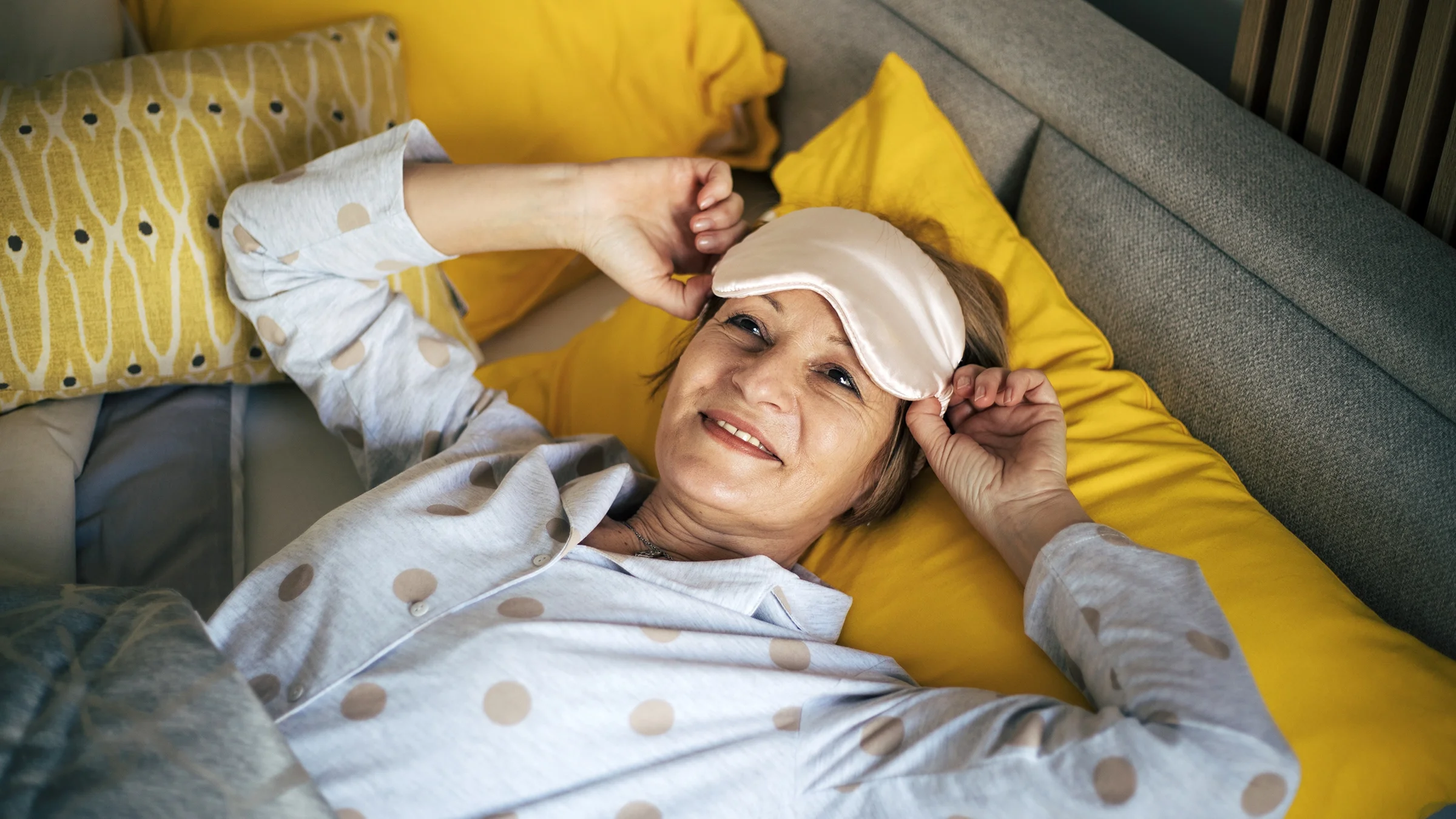Introduction
Good sleep isn’t a luxury — it’s a foundation for a healthy mind and body. Yet millions of people struggle every night to fall asleep or stay asleep, leading to fatigue, poor focus, and health problems. Getting better sleep doesn’t mean overhauling your life overnight; it’s about making small, science-backed changes that fit naturally into your daily routine.
This article shares 12 proven strategies to help you fall asleep faster, stay asleep longer, and wake up refreshed. These tips combine expert recommendations, medical insights, and real-world sleep hygiene habits that work. Whether your issue is late-night scrolling, overthinking in bed, or inconsistent schedules, you’ll learn how to build better habits and reset your body’s natural rhythm. By following these steps, you can reclaim peaceful nights and energized mornings — starting tonight.
1. Keep a Consistent Sleep Schedule
Go to bed and wake up at the same time every day — even on weekends. Your body has an internal clock called the circadian rhythm that thrives on consistency. When you follow a regular pattern, it becomes easier to fall asleep and wake naturally. Set a fixed wake time first, then adjust bedtime to allow for 7–9 hours of rest. Consistency is the single biggest factor in improving sleep quality.
2. Create a Relaxing Night Routine
Before bedtime, give your body a clear signal that it’s time to wind down. Turn off bright lights and screens, play calm music, read a light book, or take a warm shower. Avoid stimulating activities like checking emails or scrolling social media. A routine trains your brain to associate certain actions with sleep, making it easier to drift off naturally.
3. Make Your Bedroom a Sleep Sanctuary
Your environment affects how deeply you sleep. Keep your bedroom cool (around 18–20°C), dark, and quiet. Use blackout curtains or a sleep mask, and consider white noise or a fan to block out disruptions. Choose comfortable bedding and keep clutter away. A peaceful, minimalist space helps your mind relax the moment you step into bed.
4. Limit Caffeine, Nicotine, and Alcohol
Caffeine and nicotine are stimulants that stay in your system for hours, even after you no longer feel “awake.” Avoid coffee, tea, energy drinks, and chocolate at least six hours before bedtime. While alcohol can make you sleepy initially, it disrupts deep sleep later in the night, causing restlessness or early waking. A clear system means deeper, uninterrupted sleep.
5. Watch What and When You Eat
Large meals or heavy snacks before bed can cause discomfort or acid reflux, making it hard to sleep. Aim to finish eating two to three hours before bedtime. Choose lighter, balanced evening meals — think vegetables, lean proteins, and complex carbs. If you get hungry at night, a small snack like yogurt or a banana can prevent low blood sugar without disrupting sleep.
6. Get Sunlight During the Day
Exposure to natural light — especially in the morning — helps set your internal clock. It tells your body when to be alert and when to rest. Spend at least 20–30 minutes outside each morning, or sit near a sunny window while having breakfast. Proper light exposure during the day leads to stronger melatonin release at night, improving sleep quality.
7. Move Your Body Regularly
Regular exercise improves sleep efficiency and reduces stress. You don’t have to do intense workouts — even brisk walking, yoga, or stretching helps. However, avoid vigorous exercise right before bed; it can raise body temperature and heart rate. The best time to work out is in the morning or late afternoon to promote better nighttime rest.
8. Manage Stress Before Bedtime
Stress and overthinking are common sleep killers. Before bed, take 5–10 minutes for relaxation techniques such as deep breathing, meditation, or progressive muscle relaxation. Write down tomorrow’s to-do list to clear your mind. By managing anxiety before bed, your brain can shift from alert mode to rest mode naturally.
9. Control Screen Time and Blue Light Exposure
Phones, tablets, and TVs emit blue light that suppresses melatonin — the hormone responsible for sleep. Turn off screens at least 60 minutes before bed. If you must use devices, activate blue light filters or wear blue-blocking glasses. Replace screen time with reading, journaling, or listening to soothing music.
10. Use Your Bed Only for Sleep and Intimacy
Avoid working, watching shows, or eating in bed. The brain forms associations — if your bed becomes a workspace or entertainment zone, it stops being linked with sleep. If you can’t fall asleep after 20 minutes, get up, do a calm activity in dim light, and return only when you feel sleepy again. Over time, your brain will reconnect your bed with rest.
11. Take Naps the Smart Way
Naps can recharge you, but timing matters. Short naps of 20–30 minutes early in the afternoon boost alertness without interfering with nighttime sleep. Long or late naps, however, reduce sleep pressure and make it harder to fall asleep at night. If you struggle with insomnia, skip naps until your night sleep stabilizes.
12. Know When to Seek Professional Help
If you consistently struggle with falling asleep, staying asleep, or feeling tired even after full rest, consult a healthcare provider. Chronic insomnia, sleep apnea, and other sleep disorders are treatable. Cognitive Behavioral Therapy for Insomnia (CBT-I) is a proven method that helps retrain your thoughts and habits for better sleep — often more effective than medication.
One-Week Better Sleep Plan
Day 1: Set your fixed wake-up time.
Day 2: Create a 30-minute wind-down ritual.
Day 3: Make your room darker and cooler.
Day 4: Get sunlight first thing in the morning.
Day 5: Avoid caffeine after 2 p.m.
Day 6: Exercise lightly and stretch before bed.
Day 7: Reflect on your progress and adjust as needed.
This simple plan resets your sleep rhythm and builds consistency. Small wins each day lead to long-term improvement.
Troubleshooting Common Problems
Can’t fall asleep even when tired?
Avoid clock-watching. Try deep breathing or a calming visualization. If you’re awake after 20 minutes, get out of bed and do something relaxing like reading in dim light.
Waking up too early?
Keep your room darker in the morning, and avoid caffeine late in the day. Also, ensure you’re getting enough total sleep time — early waking is often a sign of short sleep duration.
Feeling groggy after sleep?
Avoid hitting snooze. Get out of bed immediately and expose yourself to bright light. A consistent morning routine trains your body to wake up naturally and alert.
Shift work challenges?
Use blackout curtains during daytime sleep, and wear sunglasses when heading home to limit light exposure. Maintain a steady routine even on off days to stabilize your rhythm.
Checklist for Better Sleep
Keep a fixed bedtime and wake time
Avoid screens one hour before bed
Dim the lights and relax
Avoid caffeine or alcohol near bedtime
Keep your room dark, cool, and quiet
Exercise regularly but not late
Practice gratitude or breathing before sleep
Read More: Quick Guide to the Coyyn Banking App
Conclusion
Sleep is more than rest — it’s recovery, healing, and balance for your entire body and mind. By improving sleep habits, you can boost energy, sharpen focus, strengthen immunity, and stabilize mood. The best part is that good sleep is achievable without drastic changes or medication. Start with one or two small adjustments — like keeping a consistent schedule and reducing screen time — and build from there.
Over a few weeks, your body will reset to a healthier rhythm. Remember, the goal isn’t perfection; it’s progress. Every night you make your environment calmer, your mind clearer, and your habits more consistent, you’re teaching your body how to rest deeply. Better sleep truly begins with better choices — and those choices start tonight.
FAQs
Q1. How many hours of sleep do adults need?
Most adults need 7–9 hours each night for optimal health and performance. Some may function well with slightly less or more, depending on genetics and lifestyle.
Q2. What helps you fall asleep quickly?
Dim the lights, avoid screens, and practice slow breathing or gentle stretches. Consistency in timing helps your body know when to sleep naturally.
Q3. Can drinking milk or herbal tea improve sleep?
Yes. Warm milk or herbal teas like chamomile and lavender promote relaxation and may help induce sleep due to mild sedative effects.
Q4. Why do I wake up at 3 a.m.?
Waking up in the middle of the night can result from stress, alcohol, irregular schedules, or temperature changes. Focus on relaxing rather than forcing sleep; it will return naturally.
Q5. When should I see a doctor about sleep problems?
If you struggle with sleep for more than three weeks, snore loudly, or feel tired despite full nights of rest, consult a doctor or sleep specialist for proper diagnosis and treatment.










